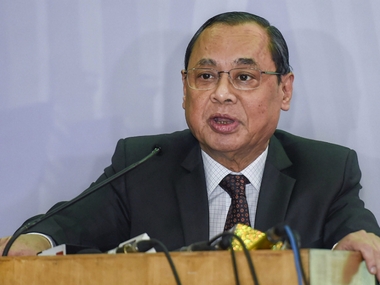Chief Justice of India Ranjan Gogoi on Tuesday highlighted the importance of an independent judiciary at the global level in the “face of rising populism” and the “continuous and recurrent waves of onslaught” from populist forces. Speaking at the two-day conference of chief justices of member nations of the Shanghai Cooperation Organisation (SCO), Gogoi said that the independence of the judiciary is not a “one-time pill but a state of affairs” that needs to remain constant. Speaking at the two-day conference in Russia’s Sochi, Gogoi emphasised on the need to develop and nurture leadership in the judiciary,
Hindustan Times reported. [caption id=“attachment_6591391” align=“alignleft” width=“380”] Chief Justice of India Ranjan Gogoi. News18[/caption] The chief justice said that independence is the very soul of the judicial system in any nation. Drawing comparison between the independence a nation’s judiciary enjoys and the stability of their governance system, Gogoi said that there were ample examples in the world to show that countries that support and invest in a strong judicial infrastructure are more likely to become nations with stable governments and administrations,
Zee News quoted him as saying.
Speaking about his experience in India, Gogoi said that the executive and judiciary enjoyed a healthy relationship of mutual respect but the rise of populism presented a challenge to the independence of courts and asked the judiciary to stand up to such forces and protect constitutional ethos. At the event, which was also attended by several other Supreme Court judges from India, Gogoi said that the ‘unelected judges’ face tremendous pressure as they have the power to overturn the decision of the elected. It is thus, unsurprising that many among their own succumb to the pressure of these populist forces.
“To some critics and naysayers, this situation presents a case for hoisting the classical counter narrative - unelected judges, acting under the constitutional mandate, get to overturn the acts of the elected majority. However, it is for us to recollect that such situations across the world have heaped tremendous pressure on judicial organs, and it is no surprise that in some jurisdictions, judiciary too has succumbed to populist forces,” Gogoi was quoted as saying. The chief justice, however, saw in this conundrum the opportunity to reinforce the judicial institution and push back against such undue pressures, stating that it also gives judiciary the opportunity to strengthen itself against such onslaught.
While speaking at an international stage with a global context, Gogoi subtly touched upon the tussle within India to define boundaries of judicial versus executive powers which more recently manifested itself in the matter of appointment of judges. “Non-political appointment of judges alone could ensure independence of the judiciary,” The Times of India quoted him as saying.
The NDA-I government had tried to bring in a legislature that diluted the judiciary’s power to appoint Supreme Court judges unilaterally, bringing in the law ministry and the country’s Opposition leader as stakeholders in appointment process to the highest court. The Supreme Court, however, struck down the law stating that political intervention in judicial appointments was more harmful than the current collegium system which is criticised by many as opaque and arbitrary. Gogoi said, “Non-political appointments, security of tenure and rigorous procedure for removal, securing reputation of and remuneration and immunities for judges, in-house accountability procedures and implementation of code of judges’ conduct are some such measures that can ensure judicial independence.” His talk when taken in the national context was reminiscent of the divide between the judiciary and executive over the National Judicial Appointments Commission. While the government had decried the judicary’s decision to strike down the NJAC law passed by the elected representatives, the court had maintained that the intrusion into the judiciary’s domain was uncalled for/ The Parliamentary Standing Committee on Law and Personnel too had said it was the "distortions" in the original mandate of the Constitution have arisen out of various Supreme Court orders which gave birth to the collegium system.


)

)
)
)
)
)
)
)
)



